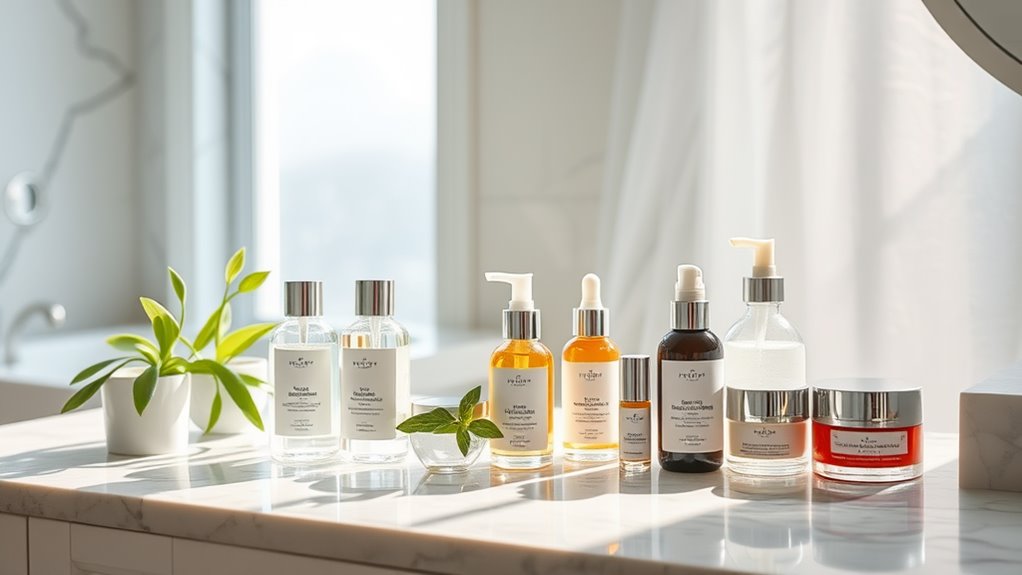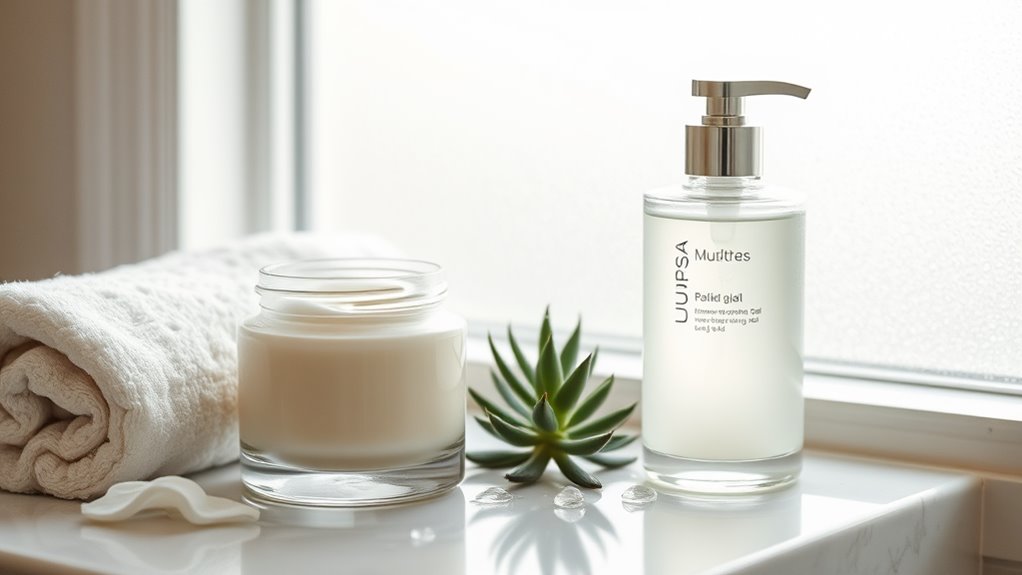The Right Products for Your Skin Type – Finally Explained
Choosing the right products for your skin type is essential for achieving healthy skin. Start by identifying if your skin is oily, dry, combination, or sensitive. For oily skin, use a foaming cleanser with salicylic acid. Dry skin benefits from rich, hydrating creams. Combination skin needs balanced products, while sensitive skin should avoid harsh ingredients. Always cleanse properly and use sunscreen daily. Stick around to discover more tailored tips and product recommendations suited for your specific needs.
Key Takeaways
- Identify your skin type (oily, dry, combination, or sensitive) to choose suitable products effectively.
- Use gentle, hydrating cleansers that align with your skin type to maintain the skin barrier.
- Select moisturizers with specific ingredients, such as ceramides for dry skin or oil-free options for oily skin.
- Incorporate sunscreen daily, choosing broad-spectrum SPF to protect against UV damage, regardless of skin type.
- Monitor skin’s response to products and adjust your routine based on seasonal changes or environmental factors.
Understanding Your Skin Type
Understanding your skin type is essential for choosing the right products. To master your skincare routine, you need to identify whether you have oily, dry, combination, or sensitive skin.
Start by observing your skin’s behavior throughout the day. For oily skin, you might notice shine, while dry skin often feels tight or flaky. Combination skin exhibits both characteristics, and sensitive skin reacts to many products.
Use these skin type tips: cleanse your face daily, avoid harsh ingredients, and moisturize based on your skin’s needs. Additionally, recognizing how different skin types respond to various products can enhance your product selection.
Pay attention to how your skin reacts to different products and adjust accordingly. Mastering this knowledge empowers you to make informed choices, ensuring your skincare products work harmoniously with your unique skin type.
Recommended Products for Oily Skin
If you have oily skin, selecting the right products can greatly improve your complexion and reduce shine.
Start with a gentle, foaming cleanser containing salicylic acid to effectively remove excess oil without stripping your skin. Follow up with an oil-free toner to tighten pores and balance your skin’s pH.
For hydration, choose a lightweight, oil-free moisturizer packed with hyaluronic acid; it’ll keep your skin hydrated without adding extra shine.
When applying makeup, opt for mattifying primers and foundations specifically designed for oily skin to control shine throughout the day.
Finally, incorporate a clay mask into your routine once a week; it’ll absorb excess oil and draw out impurities, leaving your skin looking fresh and clear. Additionally, maintaining a consistent routine is essential for achieving optimal skin balance, which can help manage oil production over time.
Recommended Products for Dry Skin
Choosing the right products for dry skin can make a significant difference in how your complexion looks and feels.
Start with a gentle, hydrating cleanser that won’t strip your skin of its natural oils. Look for ingredients like hyaluronic acid and glycerin, which draw moisture into the skin.
For toners, opt for alcohol-free formulas enriched with soothing botanicals.
When it comes to moisturizers, choose a rich cream or lotion containing ceramides and fatty acids to restore your skin barrier.
Don’t forget sunscreen; a hydrating SPF will protect your skin while keeping it moisturized.
Finally, consider weekly treatments with facial oils or overnight masks for an added boost of hydration. Natural oils like argan or jojoba can help enhance your skin’s moisture retention.
With the right products, you’ll achieve a radiant, nourished complexion.
Recommended Products for Combination Skin
When it comes to caring for combination skin, you’ll want to focus on products that balance both oily and dry areas.
Look for key ingredients like hyaluronic acid and salicylic acid, which can hydrate and help control oil.
Choosing the right product types, such as lightweight moisturizers and gentle exfoliants, can make all the difference in your skincare routine. Additionally, incorporating tailored product recommendations that specifically address the unique needs of combination skin can enhance your results.
Key Ingredients to Look For
Finding the right products for combination skin can feel like a balancing act, but focusing on key ingredients makes it easier.
When you know what to look for, you can effectively target both oily and dry areas. Here are some essential ingredients to seek out:
-
Hyaluronic Acid: Hydrates without clogging pores.
-
Salicylic Acid: Controls oil and prevents breakouts.
-
Glycerin: Attracts moisture, keeping skin supple.
-
Niacinamide: Balances oil production and soothes irritation.
-
Jojoba Oil: Mimics skin’s natural oils, providing hydration without heaviness.
Best Product Types
Maneuvering the world of skincare can be overwhelming, especially with combination skin, but knowing the best product types can simplify your routine.
Start with a gentle gel cleanser that balances oiliness without stripping moisture. Follow up with a lightweight, hydrating serum featuring hyaluronic acid to quench dry areas. For moisturizer, opt for a non-comedogenic, oil-free formula that hydrates without clogging pores.
Incorporate a clay-based mask once a week to control excess oil on your T-zone, while a nourishing cream can be applied to drier patches.
Finally, choose a broad-spectrum sunscreen that’s suitable for all skin types. By selecting these targeted products, you’ll achieve a harmonious balance that caters to your unique skin needs.
Recommended Products for Sensitive Skin
If you have sensitive skin, it’s essential to know which ingredients to avoid to prevent irritation.
You’ll also want to choose the best moisturizers and gentle cleansers that soothe your skin without causing flare-ups.
Let’s explore some top recommendations to help keep your skin calm and comfortable.
Key Ingredients to Avoid
When it comes to selecting products for sensitive skin, knowing which ingredients to avoid is essential for maintaining your skin’s health.
Using the wrong components can trigger irritation, redness, or breakouts. Here’s a list of key ingredients you should steer clear of:
-
Fragrance: Synthetic scents can cause allergic reactions.
-
Alcohol: It can strip moisture, leading to dryness and irritation.
-
Sulfates: Harsh cleansers that disrupt the skin barrier.
-
Parabens: Potential hormone disruptors that may provoke sensitivity.
-
Dyes: Artificial colors can irritate sensitive skin.
Best Moisturizers for Sensitivity
Finding the right moisturizer for sensitive skin can make all the difference in your skincare routine. You need products that deliver hydration without irritation.
Look for moisturizers with soothing ingredients like aloe vera, chamomile, or calendula. These components calm redness and provide essential moisture. Avoid fragrances and alcohol, as they can exacerbate sensitivity.
Brands like CeraVe and La Roche-Posay offer excellent options, with formulas designed specifically for delicate skin. Additionally, consider using hypoallergenic and non-comedogenic products to minimize breakouts.
Gentle Cleansing Options Available
Choosing the right cleanser is essential for sensitive skin, and you have plenty of gentle options to contemplate.
These products can effectively cleanse without causing irritation or stripping your skin’s natural barrier. Consider these top recommendations:
-
CeraVe Hydrating Facial Cleanser: Enriched with ceramides and hyaluronic acid to maintain moisture.
-
La Roche-Posay Toleriane Purifying Foaming Cream: A soothing formula that respects your skin’s pH balance.
-
Aveeno Ultra-Calming Hydrating Gel Cleanser: Infused with calming feverfew extract to reduce redness.
-
Neutrogena Ultra Gentle Daily Cleanser: A fragrance-free option that’s perfect for daily use.
-
Burt’s Bees Sensitive Facial Cleanser: A natural choice with cotton extract to nourish and soothe.
Experiment with these options to find your perfect match, and enjoy a calm, refreshed complexion!
Creating a Personalized Skincare Routine
To create a personalized skincare routine that truly works for you, it’s essential to understand your unique skin type and its specific needs.
Start by identifying whether your skin is oily, dry, combination, or sensitive. Once you know your type, select products that cater to those characteristics.
For oily skin, opt for lightweight, oil-free moisturizers; for dry skin, choose rich creams with hydrating ingredients. Incorporate serums and treatments that target specific concerns like acne or aging. Additionally, ensure you prioritize proper facial cleansing techniques to maintain a healthy skin barrier.
Don’t forget to include sunscreen daily, regardless of your skin type, to protect against UV damage.
Consistency is key, so stick to your routine for at least a month to evaluate its effectiveness and make adjustments as needed.
Frequently Asked Questions
Can My Skin Type Change Over Time?
Yes, your skin type can change over time due to factors like age, hormones, or environmental influences. Regularly assess your skin’s needs to choose the right products that adapt to these changes effectively.
How Often Should I Change My Skincare Products?
You should change your skincare products every three to six months, or when your skin shows signs of irritation or doesn’t respond to your current routine. Regularly assess your skin’s needs for ideal results.
Are Natural Products Better for My Skin?
Natural products can be beneficial for your skin, but it depends on your individual needs. They often contain fewer chemicals, which may reduce irritation, but always test for allergies before incorporating new items into your routine.
Can Diet Affect My Skin Type?
Yes, your diet can definitely affect your skin type. Consuming a balanced diet rich in vitamins, minerals, and antioxidants helps nourish your skin, while processed foods and sugars may lead to breakouts and dullness.
How Do I Test Products for Allergies?
To test products for allergies, apply a small amount to your inner forearm. Wait 24 hours to observe any reactions. If irritation occurs, discontinue use and consult a dermatologist for further evaluation and advice.





